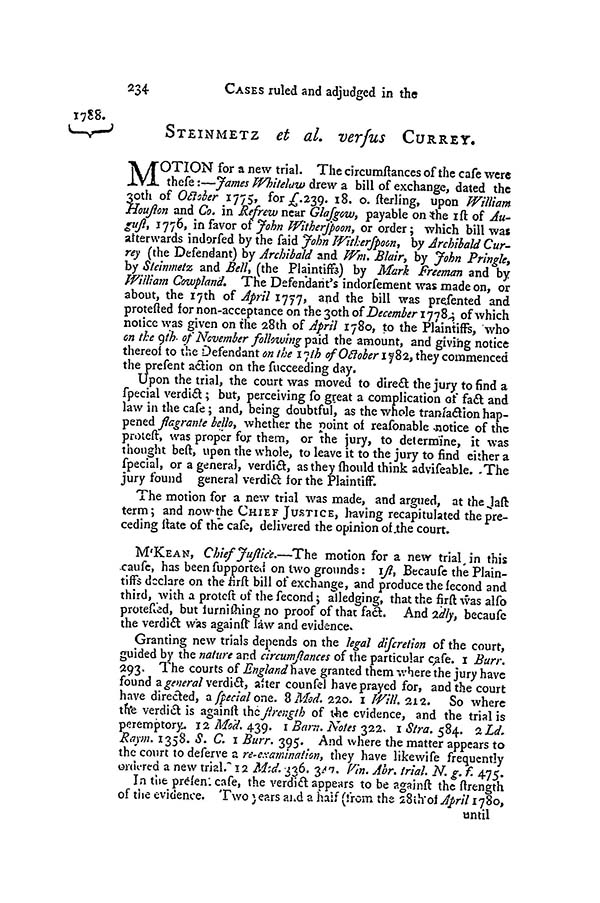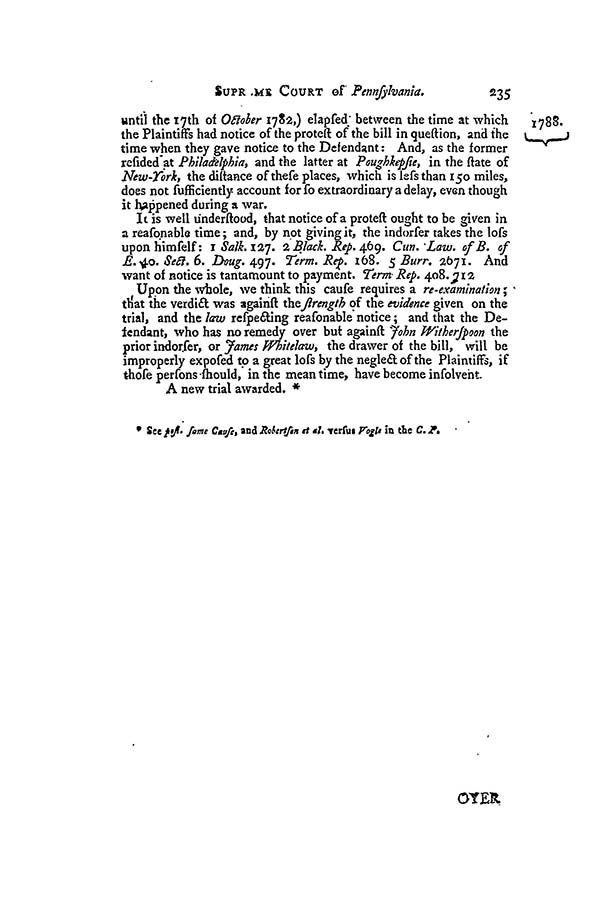Steinmetz v. Currey, 1 Dall. 234 (Pa. 1788)
Supreme Court of Pennsylvania
January Term, 1788.
Steinmetz et al. versus Currey.
Motion for a new trial. The circumstances of the case were these:—James Whitelaw drew a bill of exchange, dated the 30th of October 1775, for £.239. 18. o. sterling, upon William Houston and Co. in Refrew near Glasgow, payable on the 1st of August, 1776, in favor of John Witherspoon, or order; which bill was afterwards indorsed by the said John Witherspoon, by Archibald Currey (the Defendant) by Archibald and Wm. Blair, by John Pringle, by Steinmetz and Bell, (the Plaintiffs) by Mark Freeman and by William Cowpland. The Defendant's indorsement was made on, or about, the 17th of April 1777, and the bill was presented and protested for non- acceptance on the 30th of December 1778; of which notice was given on the 28th of April 1780, to the Plaintiffs, who on the 9th of November following paid the amount, and giving notice thereof to the Defendant on the 17th of October 1782, they commenced the present action on the succeeding day.
Upon the trial, the court was moved to direct the jury to find a special verdict; but, perceiving so great a complication of fact and law in the case; and, being doubtful, as the whole transaction happened flagrante bello, whether the point of reasonable notice of the protest, was proper for them, or the jury, to determine, it was thought best, upon the whole, to leave it to the jury to find either a special, or a general, verdict, as they should think adviseable. The jury found a general verdict for the Plaintiff.
The motion for a new trial was made, and argued, at the last term; and now the Chief Justice, having recapitulated the preceding state of the case, delivered the opinion of the court.
M'Kean, Chief Justice.—The motion for a new trial in this cause, has been supported on two grounds: 1st, Because the Plaintiffs declare on the first bill of exchange, and produce the second and third, with a protest of the second; alledging, that the first was also protested, but furnishing no proof of that fact. And 2dly, because the verdict was against law and evidence.
Granting new trials depends on the legal discretion of the court, guided by the nature and circumstances of the particular case. 1 Burr. 293. The courts of England have granted them where the jury have found a general verdict, after counsel have prayed for, and the court have directed, a special one. 8 Mod. 220. 1 Will. 212. So where the verdict is against the strength of the evidence, and the trial is peremptory. 12 Mod. 439. 1 Barn. Notes 322. 1 Stra. 584. 2 Ld. Raym. 1358. S. C. 1 Burr. 395. And where the matter appears to the court to deserve a re-examination, they have likewise frequently ordered a new trial. 12 Mod. 336. 347. Vin. Abr. trial. N.g.f. 475.
In the present case, the verdict appears to be against the strength of the evidence. Two years and a half (from the 28th of April 1780,
It is well understood, that notice of a protest ought to be given in a reasonable time; and, by not giving it, the indorser takes the loss upon himself: 1 Salk. 127. 2 Black. Rep. 469. Cun. Law. of B. of E. 40. Sect. 6. Doug. 497. Term. Rep. 168. 5 Burr. 2671. And want of notice is tantamount to payment. Term Rep. 408. 712.
Upon the whole, we think this cause requires a re-examination; that the verdict was against the strength of the evidence given on the trial, and the law respecting reasonable notice; and that the Defendant, who has no remedy over but against John Witherspoon the prior indorser, or James Whitelaw, the drawer of the bill, will be improperly exposed to a great loss by the neglect of the Plaintiffs, if those persons should, in the mean time, have become insolvent.
A new trial awarded.*
* See post. Same Cause, and Robertson et al. versus Vogle in the C.P.
Citation: Steinmetz v. Currey, 1 Dall. 234, 1 U.S. 234 (Pa. 1788).


Last modified: January 12, 2015